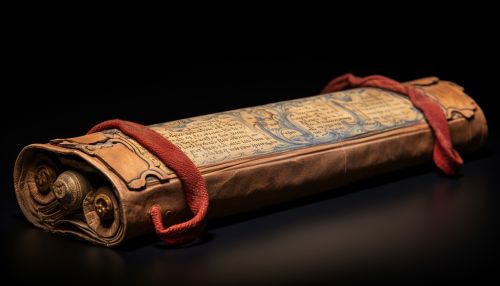Pentateuch
Overview
The Pentateuch is the term commonly applied to the first five books of the Biblical canon, also known as the Torah or the Five Books of Moses. These books, Genesis, Exodus, Leviticus, Numbers, and Deuteronomy, form the foundational narrative of Judaism and are also significant in Christianity and Islam.


Etymology
The term "Pentateuch" derives from the Greek pentateuchos, meaning "five-volumed (book)" after the Jewish designation, "the five-fifths of the law". The term Torah, meaning "teaching" or "law" in Hebrew, is the term more commonly used in Jewish tradition.
Composition
The Pentateuch is traditionally believed to have been written by Moses, the prophet and leader of the Israelites. However, modern scholarship has largely rejected Mosaic authorship, instead attributing the composition of these books to multiple authors and editors over several centuries, a theory known as the Documentary Hypothesis.
Genesis
The book of Genesis is the first book of the Pentateuch and the Bible as a whole. It begins with two different accounts of the creation of the world and mankind, followed by stories of the early patriarchs, including Adam and Eve, Noah, and Abraham. Genesis concludes with the story of Joseph, his enslavement in Egypt, and his eventual rise to power.
Exodus
The book of Exodus continues the narrative, recounting the story of Moses and the liberation of the Israelites from slavery in Egypt. It also contains the Ten Commandments and other laws, as well as the instructions for building the Tabernacle.
Leviticus
Leviticus is the third book of the Pentateuch, primarily concerned with laws and priestly rituals. It details the rules for offerings and sacrifices, dietary laws, and regulations concerning purity and impurity.
Numbers
The book of Numbers recounts the experiences of the Israelites during their 40 years in the wilderness. It includes several censuses of the people, laws, and narratives about their journey.
Deuteronomy
Deuteronomy, the final book of the Pentateuch, is presented as a series of speeches by Moses shortly before his death. It reviews the laws given in the previous books and adds some new ones.
Significance
The Pentateuch is of central importance in the religious traditions of Judaism, Christianity, and Islam. It is considered the most sacred part of the Hebrew Bible by Jews, and is also revered by Christians as part of the Old Testament. In Islam, Moses is considered a prophet and the Torah is one of the holy books.
Interpretation and study
The interpretation and study of the Pentateuch have been significant in shaping the religious, ethical, and societal norms of both Jewish and Christian communities. Various methods of interpretation have been employed, from literal readings to allegorical and mystical interpretations.
